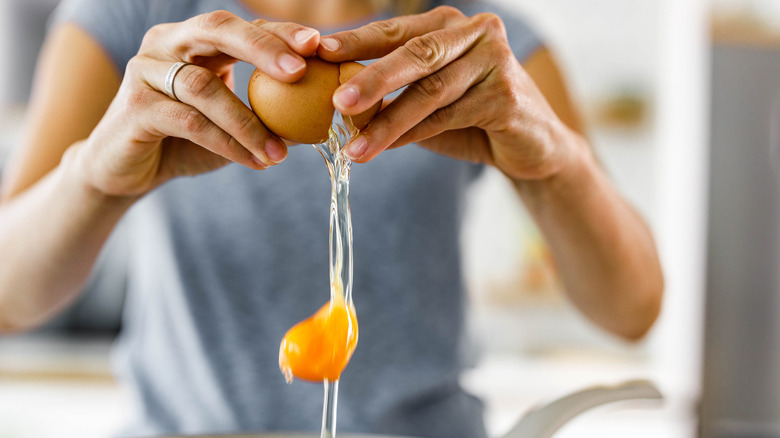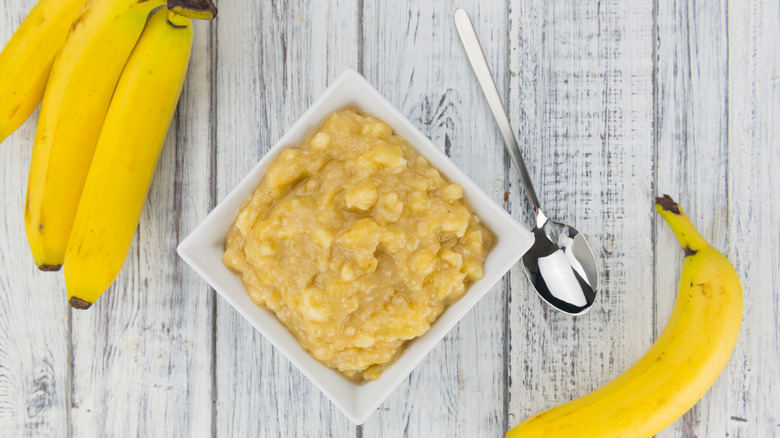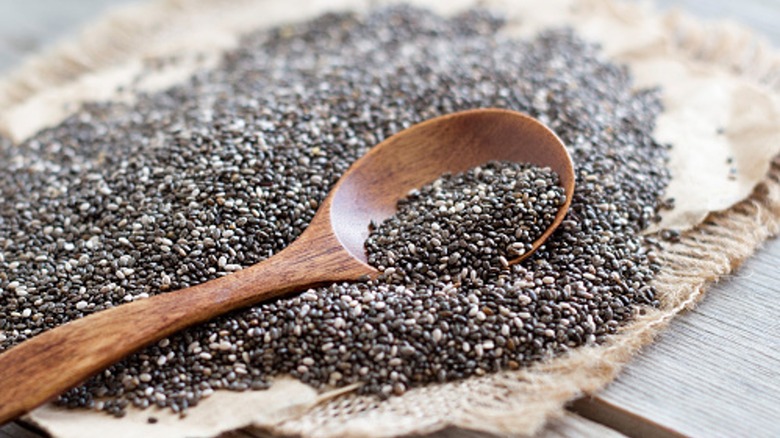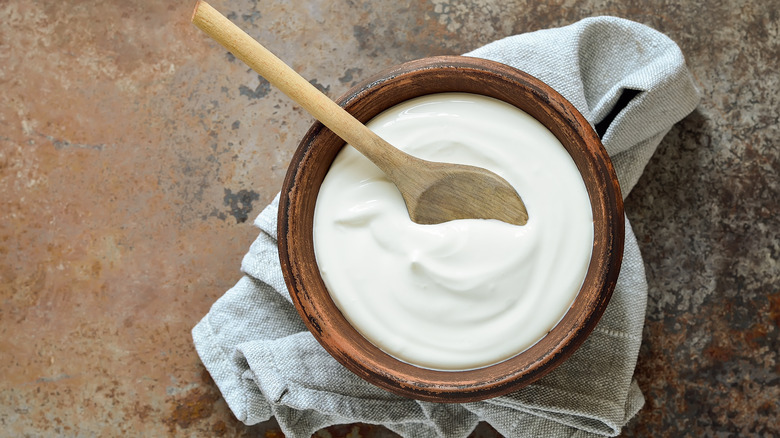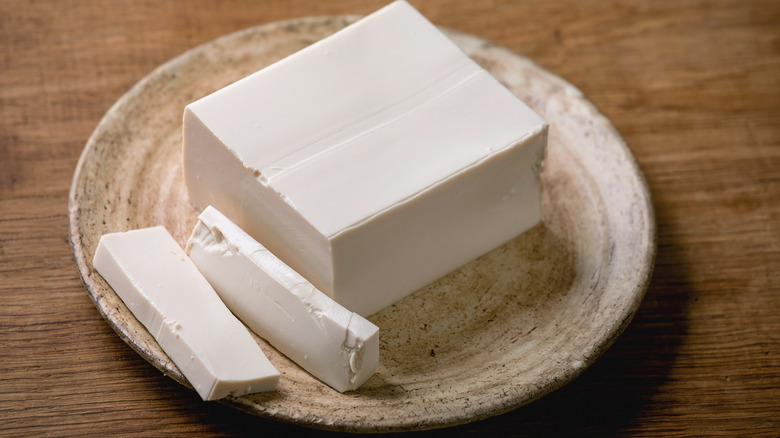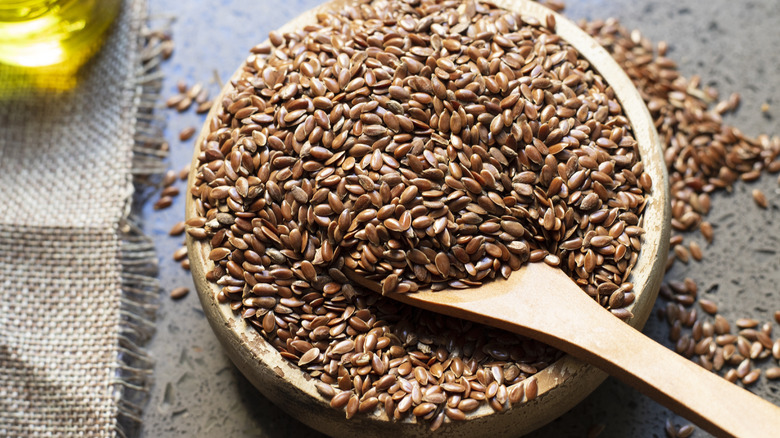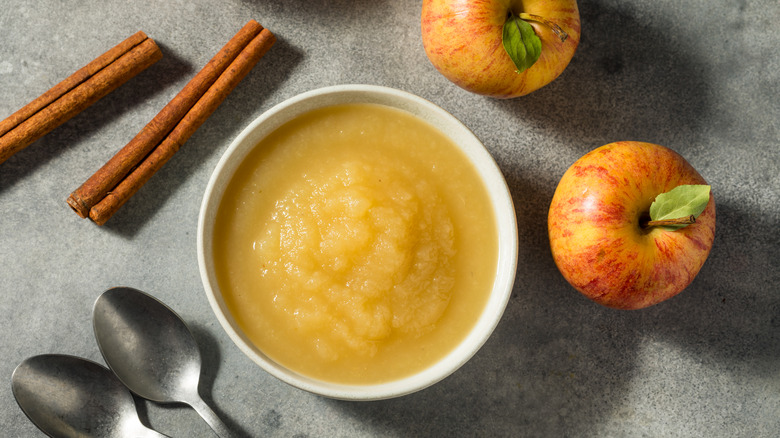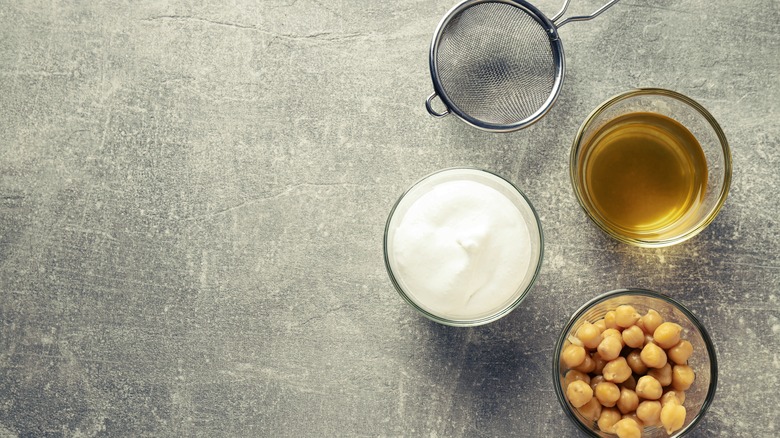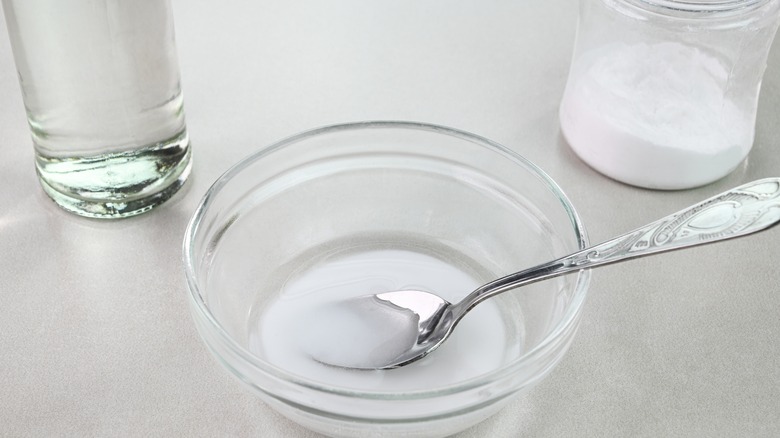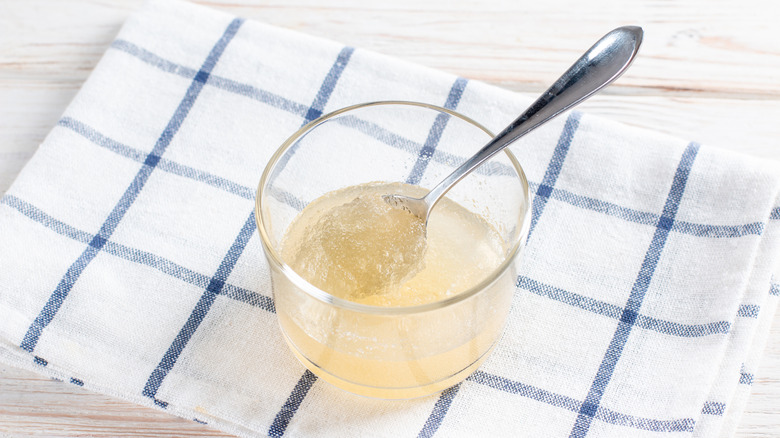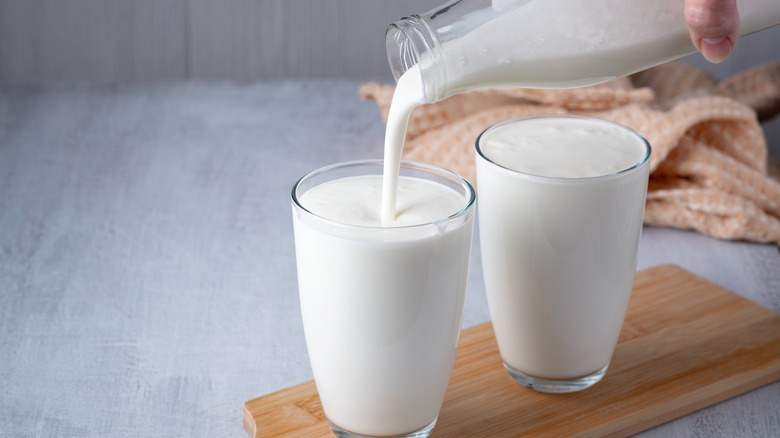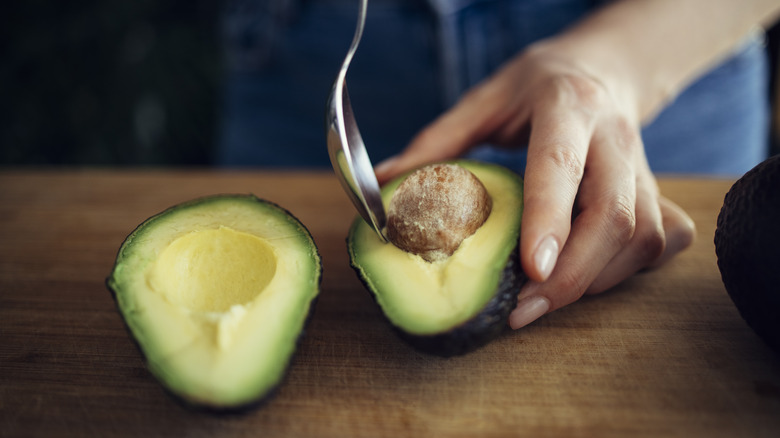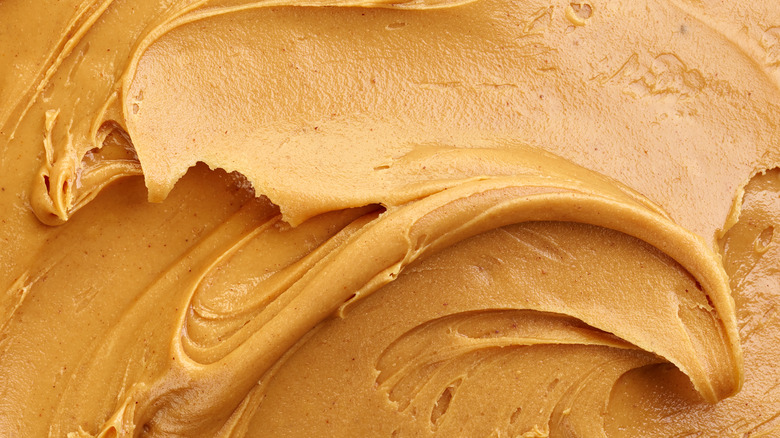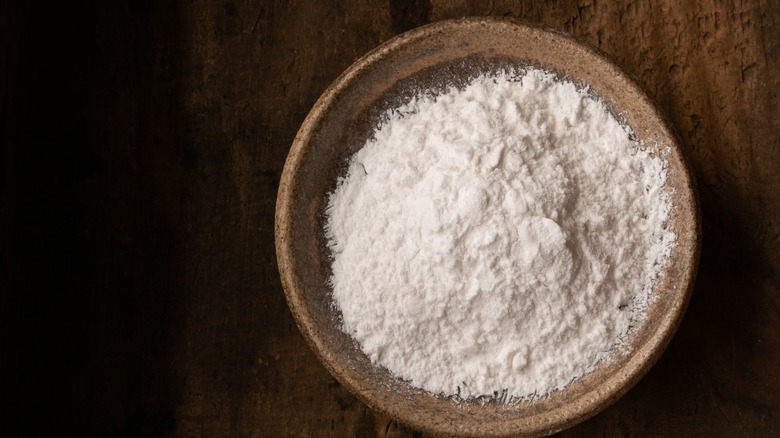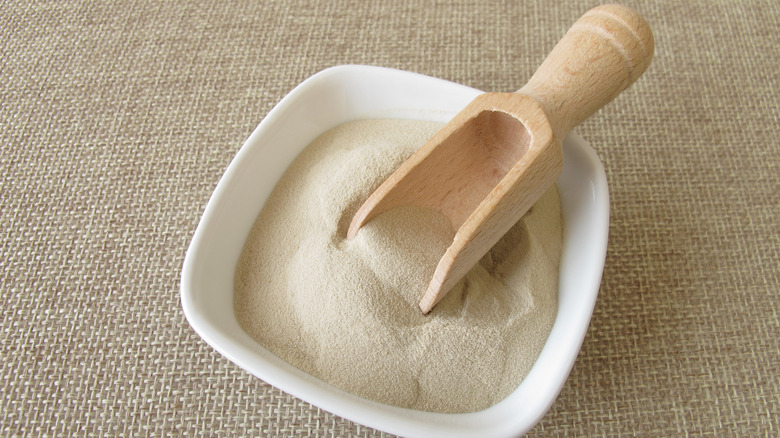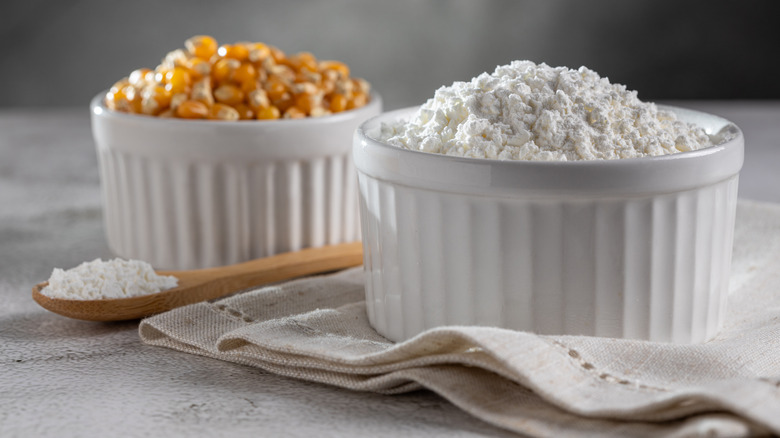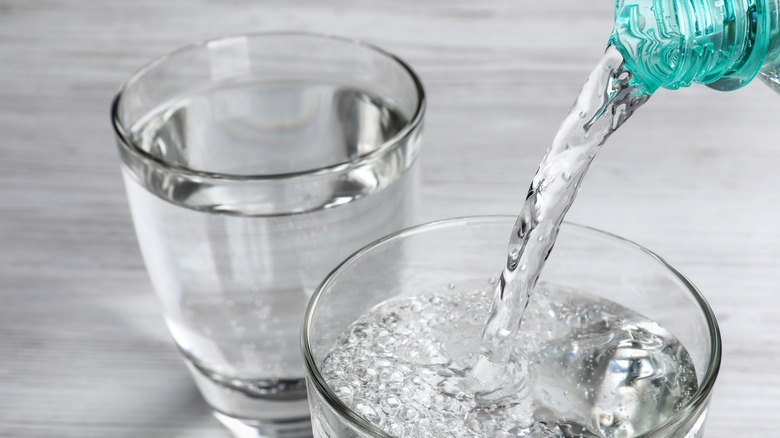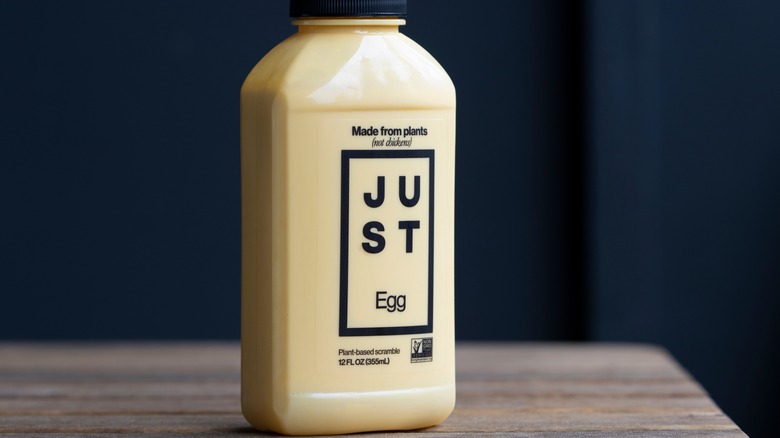The Best Egg Substitutes You Probably Already Have In Your Kitchen
There are several reasons why you may be searching for a good substitute for an egg. Maybe you have a craving for some cake, brownies, or cookies and realized that you used your last egg to make breakfast. Perhaps you are vegan but still want to be able to enjoy recipes that call for eggs. Or maybe you're just in the mood for a change and looking to see what some of the other options are.
Whatever your reason for wanting an egg substitute, finding the right one can be a little daunting. Fortunately for you, you've come to the right place! Below, we've rounded up several of the best egg substitutes. Just remember, egg substitutes are not one size fits all. The recipe you're making, your desired texture and consistency, and any personal dietary needs or restrictions could all impact which options will be the best pick.
Mashed banana
Whether you're vegan, allergic to eggs, or just need an egg substitute in a pinch, mashed banana may be the ideal solution. The mashed fruit's moist texture and ability to bind ingredients means it will bring many of the same properties that eggs do to your recipes. As a general rule, one banana should be used to replace one egg in the recipe, though you may need to adjust based on the size of the egg the recipe calls for.
However, mashed bananas are not suitable for all recipes or for all chefs. You will likely be able to taste the banana flavor in the finished product, so only choose this substitution if you enjoy bananas and think the flavor will meld with the other ingredients in your recipe.
Chia seeds
A chia egg, which is simply 1 tablespoon of chia seeds combined with 2.5 to 3 tablespoons of water, can be an excellent egg substitute in various recipes. When you add the chia seeds to the water, you'll notice that the texture thickens, almost resembling the viscous egg white. Because of this texture, chia eggs help bind ingredients together.
There are many different ways to use chia eggs. Because of the binding properties of the resulting mixture, they are ideal for baked goods like breads, muffins, and pancakes. Just remember to let the water and chia seeds sit for 5 to 10 minutes before you dump the chia egg into your batter — this will help ensure they become nice and gelatinous to perform their important job.
Yogurt
Yogurt — or even kefir — can also work as an egg substitute in some recipes. As with many other egg substitutes, it is typically best when preparing baked goods, such as cakes or brownies. The yogurt's thicker texture can help keep the other ingredients together, while the fats will add flavor and enhance the texture.
Before you pick up any store-bought yogurt, there are a few things to keep in mind. You will want to use a very thick yogurt for this hack. If the yogurt you choose is too thin, its consistency will be too different from an egg's, and the recipe may not turn out properly. If you only have thin yogurt, use a strainer to remove liquid before measuring out about ¼ cup for each egg you need to replace.
Silken tofu
Those looking for a good vegan egg substitute may want to try silken tofu. Silken tofu comes in blocks of coagulated soy milk. You'll want to purée about ¼ of a block to use as a substitute for one egg.
Using silken tofu in place of eggs may take practice. You'll need to ensure that the tofu is smooth and puréed before combining it with the other ingredients to ensure that it helps bind them together properly and that your finished product isn't overly crumbly. If you haven't bought tofu before, remember that there are several styles of tofu. Be sure to look for one that is labeled silken.
Flax seeds
If you're making cake, cookies, pancakes, or other items, some flax seed could come to the rescue if you don't have any eggs or want to avoid using them in a recipe. Simply combine 3 tablespoons of water with 1 tablespoon of ground flax seed, and let the mixture sit for a minimum of 5 minutes to make a wonderful egg substitute. Much like a chia egg, a flax seed egg is slightly gelatinous, helping to bind the other ingredients in the recipe together.
One benefit of using a flax seed egg is that, unlike some other substitutes, it shouldn't alter the taste of the recipe,. However, you may find that your finished baked goods are a little crumblier than they would be if you used regular eggs.
Applesauce
Applesauce is a popular egg substitute that you may already be familiar with. Use ¼ cup of applesauce as a stand-in for each egg a recipe calls for. While you could use sweetened or flavored applesauce, the regular unsweetened variety will have the smallest impact on the overall flavor of the baked goods you're preparing.
It is also important to note that while unsweetened applesauce likely won't negatively impact the flavor of the recipe, it will yield a finished product with a much denser texture. Fortunately, you can work around this and still use applesauce as a good egg substitute by also adding ½ teaspoon of baking powder for each egg you're replacing.
Aquafaba
Aquafaba is the liquidy brine from cooking chickpeas or garbanzo beans. The starches and proteins released by the garbanzo beans, create a thick, almost gelatinous-like, liquid that can help bind the other ingredients in a recipe together. 3 tablespoons of aquafaba is about equivalent to one egg, while 1 tablespoon can take the place of one egg white in a recipe. This egg substitute will also work best for baked goods.
One important thing to note: Depending on how many eggs you're trying to replace in a recipe, aquafaba may not be the best replacement. The texture of the finished baked goods may be off. So, if you try aquafaba as an egg replacement, consider sticking with recipes that only call for one or two eggs, or leave time for an experimental batch before making a recipe you need for an event or gathering.
Baking soda and vinegar
Chances are, you've used baking soda and vinegar before. This famous duo is well known for its cleaning capabilities. If you ever made a volcano for a science fair as a kid, then you've even seen first hand how the two ingredients can react together. What you may not have realized, however, is that baking soda and vinegar can also work well as an egg substitute.
When the two ingredients react, they produce carbon dioxide. This helps ensure that the baked goods you're preparing rise properly and turn out light and airy. A combination of 1 tablespoon of vinegar and 1 teaspoon (3:1 ratio) of baking soda can stand in for each egg that is called for.
Gelatin
Whether you are allergic to eggs or ran out, consider using gelatin as a substitute. The reason gelatin works so well all boils down to its consistency. It is thick and, well, gelatinous, meaning it will help ensure ingredients bind together for a tasty finished product. If you want to try gelatin as an egg substitute, you'll need to combine about 1 tablespoon of gelatin with 3 tablespoons of hot water. Whisk the ingredients together and then give the mixture about 2 minutes to rest and solidify before adding it to your bowl.
While gelatin can work well as an egg substitute, it is not a vegan-friendly option. Gelatin is derived from animals, so those looking to avoid animal products will want to consider one of the other options on this list.
Buttermilk
Buttermilk is another option to consider when you're searching for a good egg substitute. It's best suited for recipes that already call for baking powder, baking soda, or other leavening agents. While buttermilk can help the ingredients stay together and ensure a moist finished product, it won't do anything to help baked goods rise or expand as they cook.
If you want to try buttermilk as an egg replacement, measure out ¼ cup of the liquid for each egg you want to replace. Add it to your recipe at the same step when it calls for the eggs to be added to the bowl.
Avocado
While it might not be the first thing you think of when searching for an egg substitute, avocado can work quite well with some recipes. Its thick and creamy texture can hold all the other ingredients together in the recipe.
Avocado will be a better egg substitute for denser bakes like cakes or brownies. The fruit's — and yes, avocado is a fruit — thicker texture can cause it to weigh down lighter and fluffier recipes, such as pancakes or angel food cake. You'll need ¼ cup of avocado to stand in for each egg a recipe calls for. Be sure to know what you're looking for when choosing an avocado at the grocery store.
Nut butter
Peanut butter, almond butter, and other nut butters can also substitute for eggs in many baked goods. Nut butter is very creamy and dense, helping to bind the ingredients together. Measure out 3 tablespoons of butter for each egg the recipe calls for.
While you might be able to get away with using crunchy nut butter, for best results, stick with creamy butter. This way, the chunks in the nut butter won't interfere with its ability to hold the ingredients together. This substitute will likely influence the flavor of your dish so use it in recipes where the flavors work well together.
Arrowroot powder
If you've never heard of arrowroot powder, it is a powdery substance derived from the arrowroot plant, which is native to South America. Mixing 2 tablespoons of arrowroot powder with 3 tablespoons of water will create a slurry equivalent to about one egg, which will help bind ingredients together in different recipes.
Because arrowroot powder comes from a plant, not an animal, source, it is a vegan-friendly egg replacement. Moreover, this substitute is also a gluten-free option for those who may have sensitivities or allergies to both wheat and eggs.
Agar-agar
Agar, which you may also see called agar-agar, is a derivative of seaweed, making it another vegan-friendly egg replacement. This substitute is typically best when you are looking to replace egg whites, not the yolk or an entire egg. Like an egg white, agar will help hold the recipe components together. However, it doesn't deliver any of the leavening power of egg yolks, so you'll want to add some baking powder or mashed bananas with the agar for recipes that require a full egg.
Combine 1 teaspoon of agar powder with 1 tablespoon of water and let the two ingredients sit for about 5 minutes before warming them and whisking them together to dissolve powder fully. Next, you'll need to refrigerate the mixture for 10 to 20 minutes, whisk it one more time, and add it to your mixing bowl after all the other ingredients are combined to avoid overmixing.
Cornstarch
If you're making a chocolate mousse pie, vanilla custard, or another creamy recipe, you could use cornstarch as an egg substitute. Cornstarch can work so well in these creamier recipes because of its thickening properties.
To try cornstarch in place of an egg, stir together 2 tablespoons of it with 3 tablespoons of water. The resulting mixture should be thick and dense. After stirring the water and the cornstarch together, mix the liquid with the rest of the ingredients for your recipe, and get ready to enjoy the delicious fruits of your labor.
Carbonated water
Using carbonated water to replace an egg in your recipe may seem like an odd idea. However, you might be surprised when you look into it a bit more. First, carbonated water is unflavored, so it won't alter the taste of a baked good like substitutes on this list can. Second, all those fizzy bubbles hold air. They'll help ensure that the finished product is light and airy.
Use ¼ cup of carbonated water to replace each egg your recipe calls for. Sparkling water and seltzer water are also types of carbonated water, so they'll also work as egg replacements. Just opt for unflavored options unless you're trying to experiment with different flavors.
Just Egg
While the substitutes above can all work well when baking, they won't help you recreate scrambled eggs or an omelet. If you're vegan and want to enjoy these and other egg dishes, you might want to try Just Egg. This egg replacement, which you can pick up at the grocery store, is formulated to mimic the taste and texture of real eggs.
Nutritionally, Just Egg is pretty similar to the real deal. Each serving offers 70 calories, 5 grams and protein, 5 grams and fat, and 1 gram of carbs. Unlike real eggs, there isn't even any cholesterol. Just egg is sold in a carton, so you can easily pour it into a pan or bowl to whip up delicious breakfast creations.
